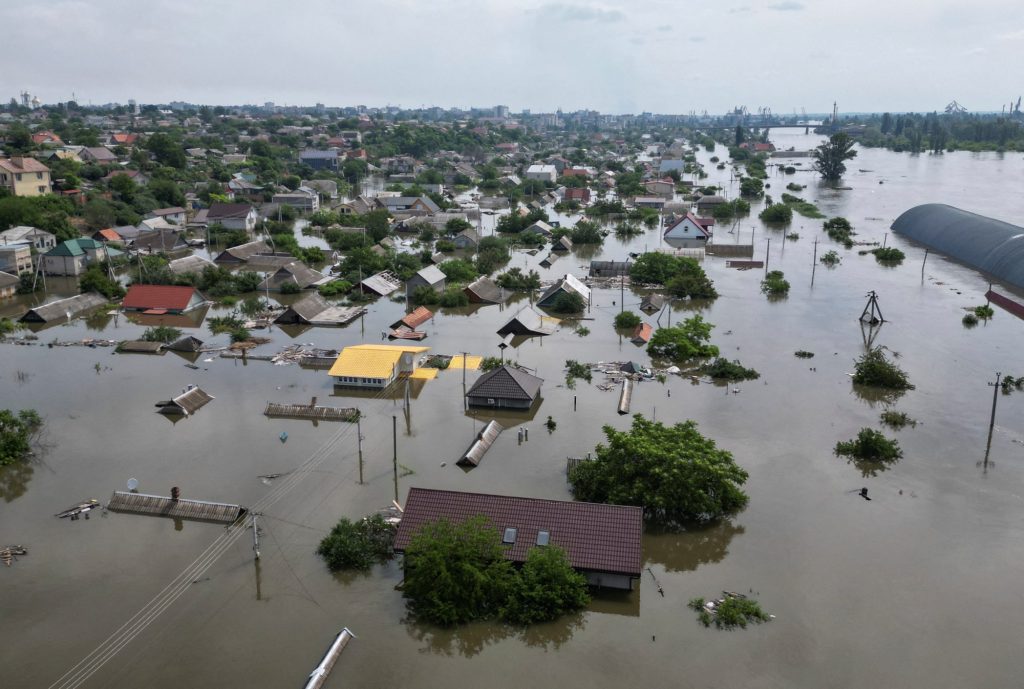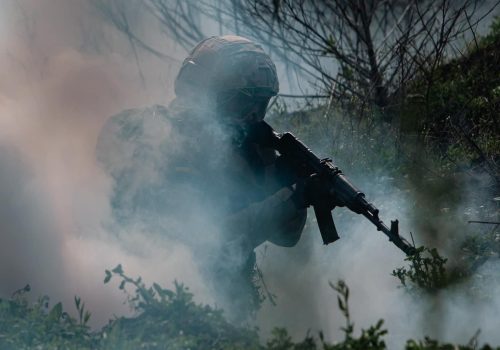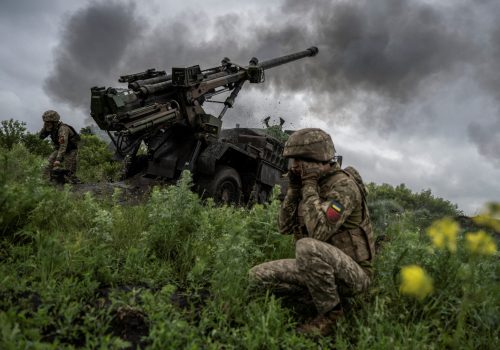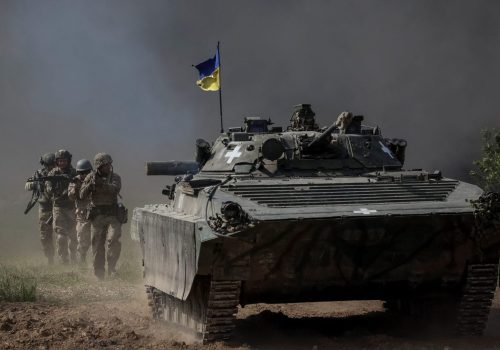In the early hours of June 6, the Kakhovka dam spanning the Dnipro River in Russian-occupied southern Ukraine collapsed, sparking a major humanitarian and ecological disaster in the surrounding area. The unfolding catastrophe has been labeled as a war crime and an act of ecocide, but holding anyone legally accountable will likely prove challenging.
The sheer scale of the disaster in southern Ukraine remains difficult to grasp. Floodwaters have already displaced thousands of people. Many more are trapped or at risk, including elderly or ill residents who were unable to leave the area earlier on in the war. Initial reports indicate that the authorities in areas under Russian occupation have restricted access to emergency services while preventing residents from leaving. There have also been widespread reports of the Russian military shelling evacuees and rescuers.
Dozens of towns, cities, and farms have been or will be destroyed as the waters continue to rise and move downstream, while large numbers of people throughout a vast area face a lack of access to clean drinking water and essential services. Much of the surrounding farmland is now unusable, which will impact the livelihoods of thousands of Ukrainians and potentially undermine global food security.
There are additional concerns over a potential nuclear disaster as the reservoir behind the collapsed dam supplies the cooling water for the nearby Zaporizhia Nuclear Power Plant, the largest in Europe. Floodwaters are also thought to have dislodged significant numbers of mines, creating further potential for civilian casualties.
Stay updated
As the world watches the Russian invasion of Ukraine unfold, UkraineAlert delivers the best Atlantic Council expert insight and analysis on Ukraine twice a week directly to your inbox.
While the Kremlin has denied blowing up the dam and has instead accused Ukraine, initial analysis strongly suggests Russian responsibility. A New York Times article citing engineering and munitions experts concluded that a “deliberate explosion” inside the Russian-controlled dam “most likely caused it to collapse.” Only Russian forces could have carried out such an explosion.
Many have also questioned the credibility of Moscow’s counterclaims suggesting the dam was destroyed by Ukrainian missile or artillery fire. Independent experts have confirmed that the Cold War era dam, which was built to withstand a nuclear attack, would be extremely difficult to destroy via external bombardment, according to The Times.
Russia also has a clear military motive and a long record of attacks on Ukraine’s civilian infrastructure. At the time of the dam collapse, Russian forces were preparing to face a long anticipated Ukrainian summer counteroffensive. The widespread flooding produced by the disaster effectively ruled out the possibility of Ukrainian troops attempting a river crossing along an entire section of the 1000-kilometer front. Meanwhile, Russia spent much of the winter and spring seasons conducting a methodical nationwide bombing campaign designed to destroy Ukraine’s energy infrastructure and freeze the country into submission. While the destruction of a major dam would mark an escalation in this campaign, it would clearly not be unprecedented.
Eurasia Center events

Despite the likelihood that Russia is responsible for the dam collapse, in legal terms it is still too early to hold anyone directly accountable. First, there would need to be incontrovertible proof that this was actually an attack rather than some kind of horrible accident, miscommunication, or mistake made amid the “fog of war.” Then, the issue of attribution would have to be dealt with. This means that Russia’s responsibility for the attack would need to proven beyond doubt.
If it can be established that Russia intentionally carried out an attack on the dam, there are many potential pathways to justice. For example, Ukraine could pursue accountability through its own domestic courts; international actors could establish a regional tribunal; the International Criminal Court could investigate and potentially indict a responsible individual; or countries could choose to exercise universal jurisdiction in order to prosecute Russia for its actions.
Unfortunately, there are many obstacles to overcome in pursuing accountability through these mechanisms. History has shown that the wheels of justice are excruciatingly slow in international war crimes cases. Prosecutors and Ukrainians alike would have to show extraordinary patience in waiting for these approaches to pay dividends. It would also be difficult to prove who ordered the attack and get that person in the dock, barring unlikely regime change within Russia itself. These are neither fair nor easy circumstances for Ukrainians to accept in the face of such trauma.
Furthermore, there are still huge information gaps. There would need to be a committed fact-finding effort, starting in the immediate present, to fill these gaps for a case that might not be prosecuted for many years or even decades. Ukrainians have shown an unprecedented ability to document abuses in real time throughout the current war. The onus would be on them to identify the individual Russian units and commanders responsible for blowing up the dam.
The challenges are even greater if Ukraine or the international community wants to pursue specific accountability for ecocide. Although there has been a lot of momentum in this direction, ecocide is not yet codified as a crime under international law (although it is under Ukrainian law). Even if this were to be accomplished in the near future and ecocide came to fall under the Rome Statute that established the ICC, there would still be enough ambiguity and lack of legal precedent to potentially deter prosecutors from pursuing the charge of ecocide in the Kakhovka dam case. There would also need to be an extensive investigation, which would not be easy given bureaucratic and financial barriers along with the fact that many affected areas remain under Russian control or are heavily mined.
In light of these obstacles, what can be done in the short-term to help hold Russia accountable for the destruction of the Kakhovka dam and its devastating consequences? First, the international community needs to broaden its view of what might constitute justice beyond the courtroom. This means listening to and supporting local civil society in Ukraine. It also means investing in Ukraine not only in the short-term, but in sustainable ways that bolster the country’s longer-term recovery and reconstruction, quite possibly by using frozen Russian assets to finance it. This requires helping the Ukrainian authorities combat corruption and build the capacity of the country’s own judicial system to pursue accountability.
In the pursuit of justice for Ukraine, the most meaningful steps are those that ensure Russia’s decisive defeat. Accountability will be much more difficult to achieve if the conflict becomes protracted or frozen. In such circumstances, it is highly unlikely that anyone will ever face prosecution over the destruction of Kakhovka dam. Ultimately, the only way to achieve a just and durable peace is through Ukrainian victory.
Danielle Johnson holds a PhD in Politics from Oxford University and is currently a Senior Ukraine Analyst at ACAPS.
Further reading
The views expressed in UkraineAlert are solely those of the authors and do not necessarily reflect the views of the Atlantic Council, its staff, or its supporters.

The Eurasia Center’s mission is to enhance transatlantic cooperation in promoting stability, democratic values and prosperity in Eurasia, from Eastern Europe and Turkey in the West to the Caucasus, Russia and Central Asia in the East.
Follow us on social media
and support our work
Image: A view shows a flooded area after the Kakhovka dam was blown up amid Russia's attack on Ukraine. June 8, 2023. (REUTERS/Vladyslav Smilianets)




